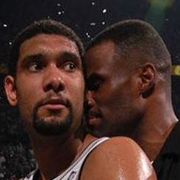|
Spoilers Below posted:I could see Gandalf Well Sauron was a maia like Gandalf. So Gandalf would definitely be able to and would be just as powerful as Sauron if he wielded it.
|
|
|
|

|
| # ? May 9, 2024 00:32 |
|
Found a letter of Tolkien's that deals with this subject:From a Letter to Mrs Eileen Elgar (draft), September 1963 posted:Of the others only Gandalf might be expected to master him – being an emissary of the Powers Unfortunately that seems to be the end of the letter, so Gandalf-as-Ring-Lord isn't expanded upon further.
|
|
|
|
euphronius posted:I understand Bombadil as evidence that the Elves understanding of the gods and creation of the world (as transmitted fictionally through JRRT's works [which are all from the POV of elves {and closely associated men}]) is incomplete (and thus somewhat flawed.) Gandalf actually mentions the fact that Elves have are self-involved in writing their histories but can we really blame anyone for writing down what they do and not going out to find and write down what other people are doing? They're elvish historians not elvish anthropologists. It's not their fault that nobody else was writing things down.
|
|
|
|
Arglebargle III posted:Gandalf actually mentions the fact that Elves have are self-involved in writing their histories but can we really blame anyone for writing down what they do and not going out to find and write down what other people are doing? They're elvish historians not elvish anthropologists. It's not their fault that nobody else was writing things down. Poor elves. They get blamed for everything.
|
|
|
|
Radio! posted:Found a letter of Tolkien's that deals with this subject: Wow, I never saw that. That's great.
|
|
|
|
Radio! posted:Found a letter of Tolkien's that deals with this subject: Now I want to read about Ring Lord Gandalf unleashing goose-stepping Hobbits against Middle Earth.
|
|
|
|
Arglebargle III posted:Gandalf actually mentions the fact that Elves have are self-involved in writing their histories but can we really blame anyone for writing down what they do and not going out to find and write down what other people are doing? They're elvish historians not elvish anthropologists. It's not their fault that nobody else was writing things down. Holy crap that's from like a year ago. That letter from JRRT I think is good evidence for my position last page.
|
|
|
|
"The Lord of the Rings" refers to Sauron, right? If so, I've long pondered what the title actually means. What is it saying, really? Other than "Sauron".
|
|
|
|
It refers to how he is the creator and ultimate master of the One, the Seven, and the Nine (but not the Three).
|
|
|
|
You could maybe also make an argument that Frodo was the ultimate "lord of the rings" as he destroyed the One and broke their collective power. If there's a twist in the title's meaning I'd say that's it. I suspect somewhere there's a letter from Tolkien on this subject debunking that theory and just saying "It's Sauron" though.
|
|
|
|
|
In Fellowship of the Rings they call Frodo the Lord of the Rings, then Gandalf (or was it Elrond?) says that that title refers to Sauron, because he alone is the one with authority over them, and proposed instead calling him "ring-bearer." Calling him the lord of something he destroyed would be rather more Roman than English, anyway.
|
|
|
|
Plus, the Red Book Of Westmarch is also known as The Downfall Of The Lord Of The Rings. That title even showed up in the RotK film.
|
|
|
|
Frodo did not destroy the Ring though. Frodo was overtaken by the Ring in the end.
|
|
|
|
That reminds me of the first part of the letter I quoted earlier, where Tolkien directly addresses Frodo's failure to destroy the Ring at the end:quote:Frodo indeed 'failed' as a hero, as conceived by simple minds: he did not endure to the end; he Source is The Letters of JRR Tolkien edited by Humphrey Carpenter and Christopher Tolkien. Radio! fucked around with this message at 14:17 on Mar 26, 2014 |
|
|
|
Pretty sure that link is filez, man. That book's still very readily purchaseable.
|
|
|
|
I actually ran into this same question once with another ebook in old GBS. The mod told me since the book was readily findable on google it wasn't a problem to link. If Hieronymous Alloy feels otherwise though I'll take it down.
|
|
|
Radio! posted:I actually ran into this same question once with another ebook in old GBS. The mod told me since the book was readily findable on google it wasn't a problem to link. If Hieronymous Alloy feels otherwise though I'll take it down. I ran this by the admins and, yeah, let's edit out the direct link. If it's readily findable on google you can just say "you can find a link to [thing] easily on google" and that's fine; if it isn't readily findable on google then we risk the forum turning into a warez site.
|
|
|
|
|
Radio! posted:I actually ran into this same question once with another ebook in old GBS. The mod told me since the book was readily findable on google it wasn't a problem to link. If Hieronymous Alloy feels otherwise though I'll take it down. That's the oddest reasoning I've ever heard. Everything is readily findable on google. Since you removed the link can you mention the source it was? I assume Letters but wanted to be sure.
|
|
|
|
This is such a good series. I recently re-listened to the LotR on audio book and it gave me a whole new appreciation for the poetry, which was always a bit tough to get through. Unfortunately, I don't have any real memories of growing up with the series discovering it only after seeing the Fellowship of the Ring. I'm always a bit ashamed by the fact and it's a bit disappointing that because of the movies I have trouble making my own mental image of some the characters and places, but thankfully Tolkien's power of description is quite elaborate so that helps. I feel the movies were pretty well cast for the most part, except maybe in the case of the hobbits. The plus is that I can see both movie and books as fairly separate since I saw the weaker medium of the two first. It was always odd I missed reading this originally considering I read mythology non-stop as a kid. It's a large reason why I find the Silmarillion so readable and why I love it now. I'd never really recommend it to people who aren't history buffs or into myths because frankly it's not an easy read. Anyway my question is in regards to translations. I recently ran across the French version of the Hobbit and was already surprised to see the Shire called Le Comté. Same thing happened in the subtitles of the French version of the film. Considering the weight and history behind so many names in Tolkien's mythos it's weird to think that every language around the world is only familiar with specific names. I'm curious to find out what the translations for other proper names were in other languages and how exactly Tolkien dealt with this, considering he was alive for most of the publications.
|
|
|
|
Thats actually a good question. Tolkiens works are so steeped in english literary history that I could see some of the subtext getting lost in translation. Speaking of, I read a post on another forum that claimed Tolkien's dedication to his love of the old Germanic languages was so great that he deliberately avoided using words that came into english through the romance languages. Any truth to this?
|
|
|
|
100YrsofAttitude posted:Anyway my question is in regards to translations. I recently ran across the French version of the Hobbit and was already surprised to see the Shire called Le Comté. Same thing happened in the subtitles of the French version of the film. Considering the weight and history behind so many names in Tolkien's mythos it's weird to think that every language around the world is only familiar with specific names. I'm curious to find out what the translations for other proper names were in other languages and how exactly Tolkien dealt with this, considering he was alive for most of the publications. Well first you might tell us what the French name means to give us some context. Second, Tolkien provided translations for place names in a bunch if different languages, though I'm sure some translators ignored him. He didn't necessarily think a place name should remain unmolested, because the place names often have meaning that's more important. So he would have been on board with the translation using a word describing a place like a medieval shire
|
|
|
|
rypakal posted:Well first you might tell us what the French name means to give us some context. So looking at a French copy of the Hobbit, it's generally a quite literal translation. The Hill of Bilbo's residence is La Colline, the River Running becomes La Rivičre Courante, Iron Mountains are Monts de Fer, etc. On the other hand some names remain the same such as Mirkwood and Long lake (though they use lac). Le Comté means the County hence shire. My copy calls Rivendell Combe Fendue and the Last Homely House is La Derničre Maison Simple or literally the Last Simple House. Combe is the same as in English and Fendue is a conjugated form of the verb Fendre to split hence Split valley or Rivendell. However, looking through other translations Rivendell has also been called Fondcombe. Fond being 'in back of, background etc' though more rarely things like bosom and crux so perhaps heart of the valley. My copy also keeps Baggins but the movies called him Bilbo Sacquet (sac being bag) and it seems a recent written translation had him as Bessac, this last few things via the French wikipedia entry. Other funny things I've found. Chapter Six: Out of the Frying Pan and into the Fire was re-written De Charybde en Scylla in reference to the Greek monsters since obviously such a phrase doesn't translate literally into French. I'm not sure though if De Charybde en Scylla is an actual idiom. I'll have to find out. The map in my copy also kept the name Rivendell on it despite changing a lot of the other labels. I guess that's just a small oversight. It seems Tolkien ended up writing Nomenclature of the Lord of the Rings, instructions to translators, but it seems to be focused on mainly Germanic languages.
|
|
|
|
100YrsofAttitude posted:Considering the weight and history behind so many names in Tolkien's mythos it's weird to think that every language around the world is only familiar with specific names. I'm curious to find out what the translations for other proper names were in other languages and how exactly Tolkien dealt with this, considering he was alive for most of the publications. Practically all the names of places (and those of a lot of characters) in the Lord of the Rings were translated into French when they were in English (or rewritten to look like the French spelling of Medieval English or German names). It's fairly appropriate since the book is supposed to be a translation in the first place.
|
|
|
|
Kassad posted:Practically all the names of places (and those of a lot of characters) in the Lord of the Rings were translated into French when they were in English (or rewritten to look like the French spelling of Medieval English or German names). It's fairly appropriate since the book is supposed to be a translation in the first place. A good example is that Tolkien would want Brandywine translated, but not Baranduin.
|
|
|
|
Kassad posted:Practically all the names of places (and those of a lot of characters) in the Lord of the Rings were translated into French when they were in English (or rewritten to look like the French spelling of Medieval English or German names). It's fairly appropriate since the book is supposed to be a translation in the first place. That makes a lot of sense actually. So people were at liberty to translate Westron but leave the Elvish.
|
|
|
|
Ynglaur posted:With regards to Galadriel the Ring-bearer (or Ring-wielder), I think she would have dominated the Nazgűl to her will. There is some small evidence that Frodo was able to do so during the attack on Weathertop. While characters in the book conjecture that the Nazgűl retreated because they did not expect resistance, and were surprised by it, I always wondered if Frodo's cry of "A Elbereth Gilthoniel!" was not in some ways a command. While he did not claim the Ring, his mere possession of it may given his words enough weight, so to speak. I seem to recall somewhere (one of the Tolkien letters?) saying the One Ring had some power over the Nazgul (by way of ruling all the Great Rings) but Sauron had the ultimate allegiance of the Nazgul by possessing the Nine (which he took back from them after they did their work). Came up in the context of if Frodo had claimed the One Ring at Mount Doom without Gollum interfering and the Nazgul made it back in time as I recall; suggested the Nazgul couldn't directly turn on Frodo but they could make a show of bowing down to him while discretely luring him away from the lava (and sealing the entrance behind them) by way of suggesting he "look out upon his new domain". Basically hold him there until Sauron made it out there, whereupon Frodo's chances would have been... slight. Can't track down where I read this, so take it with a grain of salt though.
|
|
|
|
That's really interesting. I always assumed the Nazgűl possessed the Nine, but I think "which he took back from them..." is correct.
|
|
|
|
Is there a gain/loss equation in Sauron's rings? Which seem like the opposites of Feanor's creations, in function. That is, by Sauron investing X amount of his power in the Rings, he was weakened by Y. The Sil states clearly (I think) that Melkor was irreparably weakened by his actions in Middle Earth, so it would fit if Sauron was as well.
|
|
|
redshirt posted:Is there a gain/loss equation in Sauron's rings? Which seem like the opposites of Feanor's creations, in function. I don't think there's like a mathematical equation anywhere but I'm virtually certain it's stated in several places that Sauron put much of his own power into the One Ring, which is why he was so diminished when it was lost and would be essentially destroyed if it were destroyed.
|
|
|
|
|
Hieronymous Alloy posted:I don't think there's like a mathematical equation anywhere but I'm virtually certain it's stated in several places that Sauron put much of his own power into the One Ring, which is why he was so diminished when it was lost and would be essentially destroyed if it were destroyed. Yeah, I didn't mean like a D&D level power measurement (though no doubt D&D is based on exactly this story), but rather Sauron must have known the risk he was taking by creating the Rings as such. He obviously thought it was worth it since he did it, but I wonder about his own calculations - he must have been doing some kind of cost-benefit analysis. Heh. Like, literally if I put X percent of myself in these Rings I'll lose Y percent of my own vitality. I've always assumed that's a difference between Sauron and Melkor. Melkor just did stuff, out of sheer ego. Sauron had Melkor's example in front of him, and a much lesser set of foes.
|
|
|
|
redshirt posted:Is there a gain/loss equation in Sauron's rings? Which seem like the opposites of Feanor's creations, in function. I think of it like it was an effort that took a lot out of him and it would probably be another billion years before he recovers his energy to do something that great again. Melkor, for example, will return eventually and recover his strength, but by that point the world will be over. There's no mathematical formula, it's just that doing all the stuff they did eventually drained their mental and physical energy and it will take time for them to recover. But their recovery time is so long that it might as well be eternity. Elves age the same way. Those that went to Valinor have a lot less stress and the magical protection of the valar keeps them young for much longer. But those that stayed on Middle Earth age and grow weary more quickly. Cirdan, for instance, eventually grew a gray beard he stayed on Middle Earth so long.
|
|
|
|
There also seems to be a notion in Tolkien that artists have one "Great Work" in them and aren't endlessly creative. Feanor tops out with the Silmarils, etc.
|
|
|
|
|
Hieronymous Alloy posted:There also seems to be a notion in Tolkien that artists have one "Great Work" in them and aren't endlessly creative. Feanor tops out with the Silmarils, etc. Yeah, but he usually prefaces it by saying something "until the end of the world" "never again on this world" implying that after the end of the world things get reset, for the immortals at least. No one knows what happens to mortals. Men apparently will have a place in the next music of the Ainur.
|
|
|
|
Hieronymous Alloy posted:There also seems to be a notion in Tolkien that artists have one "Great Work" in them and aren't endlessly creative. Feanor tops out with the Silmarils, etc. I got a chuckle thinking of Melkor waxing poetic on this like Feanor and Olwe: And Melkor spoke before the Valar, saying: "The Fire of my Might has passed away, and lives now only in the memories of Beleriand and the shadows of the destruction I have wrought. Foresighted was I! Even for those who are mightiest under Ilúvatar there is some work that they may accomplish once, and once only. The Marring of Arda I brought into being, and within Eä I can do so never again. Yet had I release from the Void for but a little while I could recall life to the Valaraukar, the Uruloki, and many other things, ere they pass for ever from Middle Earth; and then your healing should be once more hurt, and the malice of Melkor be reborn anew."
|
|
|
|
I'm surprised somebody still hasn't written LoTR or Silmarillion from the perspective of a Romantic Sauron or Morgoth. Sauron could represent the long-oppressed East and Orcs, it would be easy. Morgoth would be harder and would have to be Gothic Romantic as per Folderol.
|
|
|
|
Gianthogweed posted:Yeah, but he usually prefaces it by saying something "until the end of the world" "never again on this world" implying that after the end of the world things get reset, for the immortals at least. No one knows what happens to mortals. Men apparently will have a place in the next music of the Ainur. This got me thinking, did Tolkien ever address what happens to orcs after death or is it one of those things he sort of hand-waved away? If you look at it from the perspective of orcs being corrupted elves I could see an argument for their just going to the Hall of Mandos they would have had they not been corrupted, except that there's still the weird disconnect with elves being immortal and orcs being mortal (presumably?).
|
|
|
|
Radio! posted:This got me thinking, did Tolkien ever address what happens to orcs after death or is it one of those things he sort of hand-waved away? If you look at it from the perspective of orcs being corrupted elves I could see an argument for their just going to the Hall of Mandos they would have had they not been corrupted, except that there's still the weird disconnect with elves being immortal and orcs being mortal (presumably?). So little is known about the orcs and what is known is often disputed or in conflict with other facts. No writing from the orcs perspective has survived so there's no way to know for sure of their fates or how they came to be. I'm pretty sure Tolkien did this on purpose. His writing style was such so as to appear only as a translator of ancient texts that had recently been discovered. Since the orcs ultimately lost the conflict and died out as a race we never did get to see things from their perspective. It's only in the post modern age that you actually see history from the loser's perspective.
|
|
|
|
Were Orcs ever described as mortal in the same vein as Men or even Dwarves? I had always assumed that they were immortal like the Elves.
|
|
|
|
Gianthogweed posted:I think of it like it was an effort that took a lot out of him and it would probably be another billion years before he recovers his energy to do something that great again. Melkor, for example, will return eventually and recover his strength, but by that point the world will be over. There's no mathematical formula, it's just that doing all the stuff they did eventually drained their mental and physical energy and it will take time for them to recover. But their recovery time is so long that it might as well be eternity. Elves age the same way. Those that went to Valinor have a lot less stress and the magical protection of the valar keeps them young for much longer. But those that stayed on Middle Earth age and grow weary more quickly. Cirdan, for instance, eventually grew a gray beard he stayed on Middle Earth so long. I always thought that Cirdan's beard symbolized his wisdom or magic or something, but he has it just because he's old. I thought that elves were immortal. But then again Cirdan is the most ancient living elf on Middle Earth.
|
|
|
|

|
| # ? May 9, 2024 00:32 |
|
TildeATH posted:I'm surprised somebody still hasn't written LoTR or Silmarillion from the perspective of a Romantic Sauron or Morgoth. Sauron could represent the long-oppressed East and Orcs, it would be easy. Morgoth would be harder and would have to be Gothic Romantic as per Folderol. And I guess there's Michael Aquino's Morlindalë too, if you want a Satanist's take on the mythology....
|
|
|



































